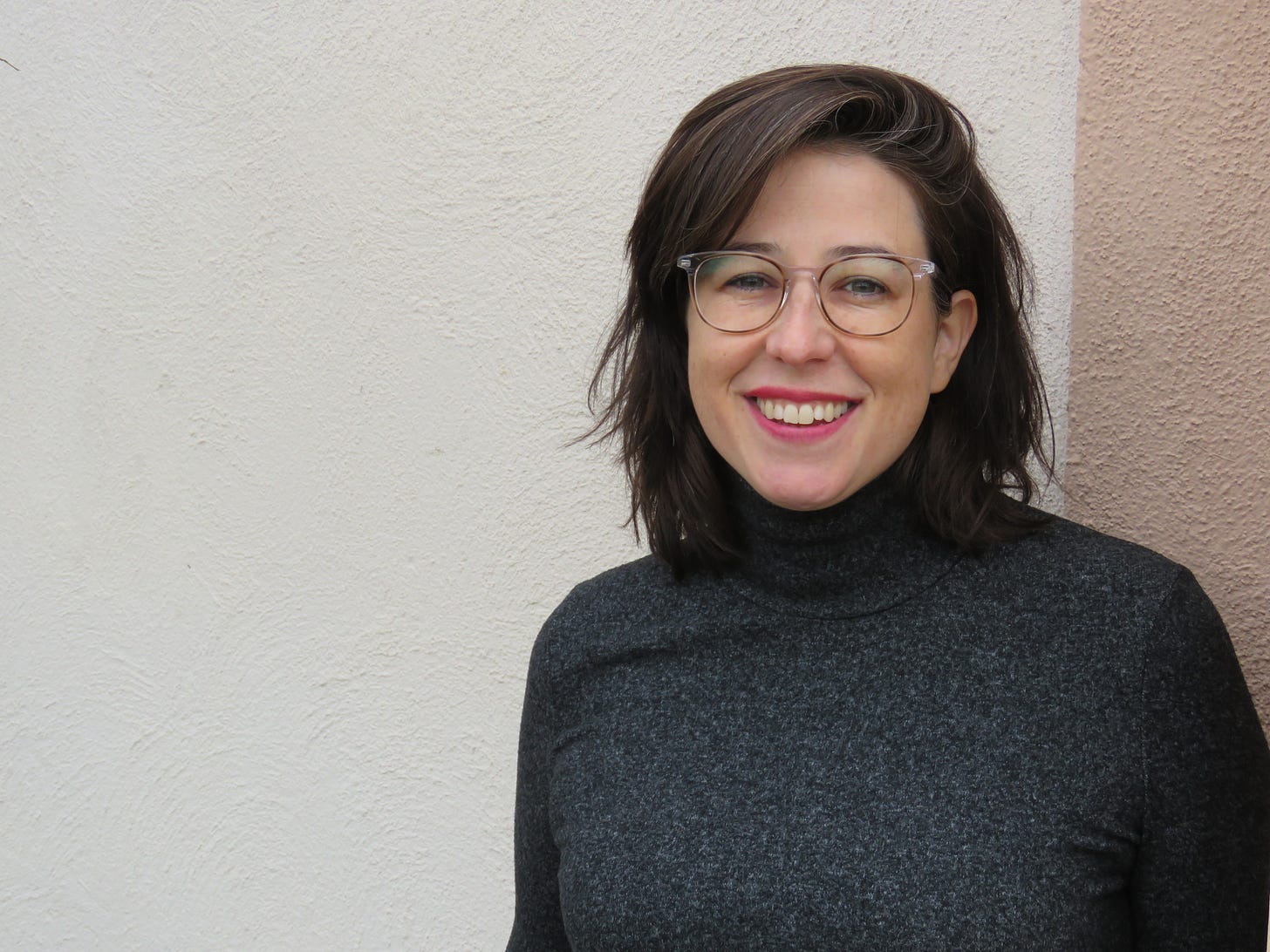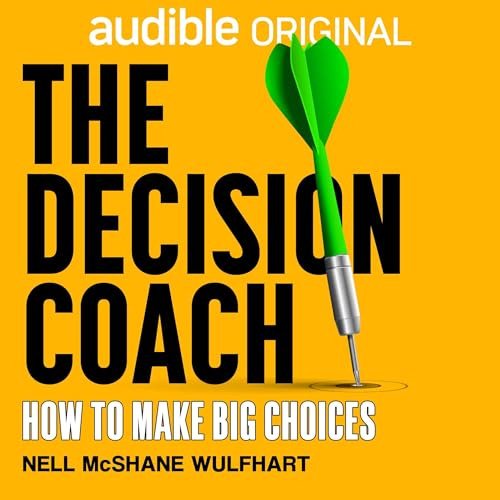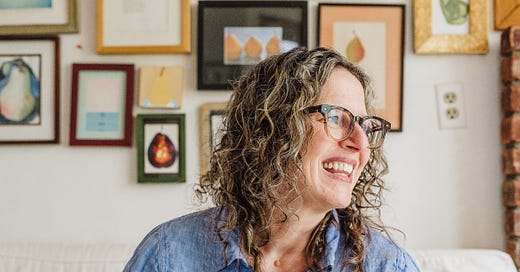
Discover more from Write More, Be Less Careful
"we need to make decisions for the people we are, not the people we aspire to be one day"
Decision Coach Nell Wulfhart solves all our writing problems, from changing careers to deciding what to write next
Hello there! Welcome to Write More, Be Less Careful, a newsletter about making space for creative practice in a busy life. My next book, The Good Mother Myth, will be out in January 2025, and you can pre-order it now!
Today’s post is in the tending section, which is a mix of essays and interviews about creative practice that do a deeper dive into a particular craft element or process question. This post is a really special one—Nell Wulfhart, the Decision Coach, answers a bunch of reader questions about making choices in our writing lives.
Today’s tending features Nell Wulfhart, the Decision Coach, and instead of our usual one-question format, Nell answered 5 (five!!!!!) subscriber questions. I was so excited when I got Nell’s answers to the questions I’d shared with her because, where I would do a ton of hedging and “on the one hand, but” and “well, that’s really tricky because” (why yes I am a Libra) Nell just gives an answer. (This is why she is the Decision Coach and I am the friend you call to vent. I’m pretty good at pep talks, too, though!) I love that clarity, and I particularly admire the way it’s backed up with a framework for decision-making. Whatever choices you’re facing in your writing life, I think you’ll get a lot out of Nell’s advice.

Question #1: stay in writing, or follow a new career?
Ever since having my third child, I’ve been struggling to find the excitement and passion I previously felt for my established writing career (I’m a published novelist with bylines in major publications). I’m working on two writing projects currently and while I enjoy them, I find that they don’t have the real-world practicality of other career focuses, or even of volunteer work I do locally (including as President of our PTA at our local Title 1 public school).
For a few years, I’ve been kicking around the idea of going back to school to get a master’s degree in social work, with the ultimate application of becoming a therapist and/or working in and around school-aged children. What nags at me is that I know how much time and work that degree and setting up an entirely new career at the ripe (ha!) age of 44 entails as well as the fact that I feel like I’m “abandoning” my writing career and likely won’t have the needed time to finish the projects I’ve already spent years drafting (oh, the feeling of “failure” when met with non-completion).
Should I apply to the program and if so, what’s the best timing? My kids are almost 3, 6, and 9, so all school aged but obviously still a ton of caregiving work still demanded. Then again, life is short. I worry if I keep waiting, I’ll always regret not making this leap. Thanks for your insights, Nell!
Nell says:
I once had a client in her mid-50s who was in her second year of med school! It is TRULY never too late.
Sometimes projects (especially writing projects) don’t get done. And I feel you! I have several multi-thousand word stories mouldering away in Scrivener that I’m just….never going to complete. I hate wasted work as much as anyone, maybe more, but by reframing those projects as “writing practice” or “creativity exercises” it’s easier for me to let them go.
One hint that it’s time for a change is that you’ve been thinking about this change for a few years. If there’s an idea that’s been buzzing around in your brain for a long time, I’m here to tell you that the buzzing doesn’t stop until you try it out.
One piece of advice I give to clients in this situation all the time is to do a little testing before jumping into grad school. How much do you know about the day-to-day work of a therapist, or working with school-aged kids all day every day? Before committing to a master’s degree, it’s a good investment of your time to have some coffees with people who are already doing the job you think you want—ask them about the hours, the paperwork, the availability of jobs, the toll it takes on their mind/body/soul! Shadow people for a couple of days, if you can swing it!
The way we make good decisions isn’t by sitting at home and wondering if we want to do something; it’s by testing it out as much as we can. Gather all the info you can on these potential jobs and then, if you still think it’s a good fit, go for it! As for the best timing, my opinion on that is almost always ASAP. Let’s get the hard part over with so we can enjoy the good part for longer.
And remember, no decision is set in stone! If that passion for writing returns, you can always go back to it (and your kids will be older, which will make it easier).
TL;DR: Try something new.

Question #2: what to work on (or take a break) while a book is on submission?
Dear Decision Coach,
I have been writing novels and working towards the goal of getting them traditionally published for what is now becoming an embarrassingly long time. (I wrote my first novel in 2006 and sent my first query letter in 2012.) I got an agent, but we weren’t a good fit, so we parted ways, and I signed with another agent who I absolutely love. We went on submission two years ago with a YA novel that didn’t get picked up. Now we’re on month seven of submission with a second YA novel — still no takers.
I want to be working on something else while I wait, especially because I figure if this one doesn’t sell, I should have something else ready to go. Here are the options I keep oscillating through:
1. Continue work on another YA novel that I started in the spring. It’s very similar in tone to the one that’s currently on submission, so if that one gets picked up, it would make sense to have this one coming down the pipeline. On the other hand, it’s starting to feel like maybe I’d just be writing yet another YA book that no one wants to publish.
2. Pivot away from YA and revise this first draft I have of an adult thriller novel. My agent thinks this one could be timely and of interest to editors. Only problem? My agent, my beta reader, and I all agree that it needs a major plot overhaul, but I have absolutely no idea how to fix all the plotting problems. Every time I try to work on it, I end up getting nowhere and feeling frustrated.
3. Write a different adult suspense novel. I have some very vague ideas percolating, but there’s a good chance I might run into the same issue as with #2. Plotting twists and turns is not my strength, although I do love suspense novels.
4. Just take a break from writing novels this fall and refill my creative well. Work on smaller writing projects. Read. Watch films. Go places. Teach more writing classes. Try not to be so Type A and try not to feel guilty about “not making progress.” Try not to have a total mid-life crisis breakdown spawned by the fear that I will never achieve the dream I’ve had for myself since first grade, and that every day that goes by is a wasted day, bringing me closer and closer to death and the final admittance of my own failure. Yes, I’m being dramatic, but also… those are feelings I have sometimes.
I realize your answer might be a combination of #4 and “write the thing you feel most excited and passionate about; trust the creative process.” But still, I’m curious to know your advice.
Nell says:
Actually, I think you should write the thing you think will sell.
Selling something is what you’ve been aiming for for a long time. Selling something will give you the momentum you’re seeking. It’s time to pivot from YA. “If that one gets picked up, it would make sense to have this one coming down the pipeline” is NOT a good reason to write a new YA novel. If the one that’s out on submission now gets picked up, you can always go back and work on this draft. But don’t make decisions based on vaguely possible “maybes,” the outcomes of which are entirely beyond your control.
Plotting is something I am also VERY bad at, but I have gotten around this problem by working with other people (either picking their brains for plot ideas over wine) or by plotting out something together that I then later go off and write. Hire a book coach. Steal an idea from your favorite thriller author. Hell, ask ChatGPT (for plot inspiration ONLY, don’t @ me!) But work on the thing your agent thinks can sell.
By the way, I think we need to make decisions for the people we are, not the people we aspire to be one day. If you’re Type A, just lean into it and harness those “get it done” personality traits to, you know, get it done.
By the way, I laughed your #4 description. Good writing!
Question #3: go back to a full-time job or pursue writing more seriously?
Hi! Thank you for this invitation. I’m just starting in my substack and committing to writing consistently. I have been fortunate to be on a mid career sabbatical this year and now have to choose between two paths as I’m trying to make re my writing as I end my sabbatical:
1. Pursue a full time job again, this would allow me to have consistent income to hopefully keep writing but historically it has been challenging for me to do this, hence getting back to writing while on sabbatical not while in my previous role.
Or
2. Prioritize my time towards writing and honing my voice and support my life with periodic consulting work as I build and monetize substack, speaking etc. this might give me space to finally right the book I’ve wanted to write. The risk of course is financial… and monetizing what is currently a source of exploration and joy. It would be a big life change to be creator first instead of prominent salaried role!
Nell says:
So, this kind of decision is one I get ALL THE TIME. Do I quit the job I hate to do the thing I love that doesn’t pay now but maybe it could, one day?
The actual decision will depend a lot on 1) your specific financial circumstances and 2) your personality.
Let’s talk about #1 first. Do you have a financial safety net? Do you share bills with someone who makes a good income? If you do, then take some time and space to write the book you’ve always wanted to write. Don’t consult, don’t work full-time. Give the book a chance to manifest and evaluate after six months.
Now, #2. Are you a hustler?
Making a living as a Substacker, content creator, speaker, consultant, etc. is HARD and TIME-CONSUMING.
As someone who was a full-time freelance writer for many years, I will tell you it is constant selling, constant pitching, many jobs that you take just for the money and hate every minute of them, and virtually no job security. Sick for a couple of weeks? Too bad, no money for you.
And you’re doing all this AND writing the book of your dreams? It’s a tough sell.
Being self-employed is all hustling and self-promotion and it takes a lot of confidence and nerve. If those aren’t your strong points, then either stay in the full-time job and make a C- effort there in order to give yourself more time to write or find a less time-consuming job that gives you more time to write.
Also! One question you need to ask yourself here is “what do I want the most”? A portfolio career as a professional writer/consultant/speaker? Or to write a book? I love (and have!) a portfolio career, and encourage people to become self-employed all the time, but if you want to write a book more than you want a portfolio career, then you should arrange your life to meet that one most important goal, and not take a sort of Plan B approach that leaves you with a career that involves plenty of writing but no book.
[ed. note: I’d never heard the term “portfolio career” before this, but I love it. My understanding is that a portfolio career is one with many parts—maybe podcasting, freelance writing, consulting, editing—rather than one central role. I think the way Nell uses that term in the context of what you want the most and what you know about yourself (and your finances!) as a worker and a writer is really clarifying. Do you need a stable job that will make writing on the side possible and sustainable, or can you juggle lots of different roles and keep your writing in the mix?]
Question #3 variation: write full-time or get a job?
I’m trying to decide if I should try to make writing a full-time gig (have it pay the bills) or get a job so I don't stress but have WAY less time to write. I know this is such a personal thing to think about—I really want to go full time, but not sure what freelancing can look like.
I am trying to work out whether to build a freelance writing business or stay in a job I absolutely hate and which doesn’t pay enough and use my extra time to edit and do the find-an-agent thing with my novel.
Nell says:
Re: freelance writing business, this will take a long time to build and a lot of energy to sustain. See above! But it occurred to me—why are these the only two options? If you hate the job and it doesn’t pay enough, maybe finding a job that pays better and you don’t totally hate should be your first priority. I love finding a third option, and a new full-time job + writing time seems like a good solution because [again, see above].
Question #4: submit to contests vs publishers?
I’d love to hear more about submitting to contests for the money and recognition vs submitting your work to a publisher to see it in the world sooner.
Nell says:
Do both. I’m a massive fan of trying everything at once. That’s how you collect data, and spend less time waiting for other people’s stamp of approval. Just try every idea you have at the same time and see what works and what doesn’t. It’s the most efficient way to find the answers to your questions.
Also, just curious here, is there much money and recognition in writing contests? This is not my area of expertise but it seems like a long shot (traditional publishing is, too, but it comes with more credibility and prestige as far as I know). Maybe Nancy can chime in here.
[ed. note: I’m not really sure what to say re money/credibility/recognition and writing, other than lol/sob. I think Nell’s answer to “just try everything!” is a great one, and is definitely the path I’ve followed in my writing life.]
Nell McShane Wulfhart is a decision coach. It’s a job she invented 11 years ago, and has been doing ever since. She only offers one thing: a single session in which she helps someone make a big decision. She has helped people decide where to live, whether to get divorced, what to name their baby, whether to get a tattoo removed, whether to take a job offer, when to retire, if they should have a kid, what color to paint the kitchen...and pretty much anything else you can think of. She’s coached mayors, Olympic athletes, hedge fund managers, students, parents, filmmakers, etc. New York Magazine said she has “an unvarnished warmth that lands somewhere between cool aunt and favorite camp counselor.” She’s also been a journalist, a New York Times columnist, and author. Read about Nell here, and sign up for her newsletter at decisioncoach.com.
You can find The Decision Coach podcast on Audible, Apple, Spotify or wherever you get podcasts.
💬 a question for you 💬
I love Nell’s no-nonsense approach to making decisions, and I’d love to know: what’s the best advice you’ve ever gotten? Who’s helped you untangle a tricky choice, whether it was in your writing life, or just generally?
Write More, Be Less Careful is a newsletter about why writing is hard & how to do it anyway. I’m so glad you’re here.
If Write More has helped you in your creative life, you can support me by sharing it online or with a friend, or by pre-ordering my next book, The Good Mother Myth.



















What a fun and helpful read!
This was such a great interview, and I love Nell’s answers!
Something that has helped me decide between two choices has been to have someone sell me on one and then really tune into my reaction— does it feel like permission or does it make me bristly?— and act accordingly!